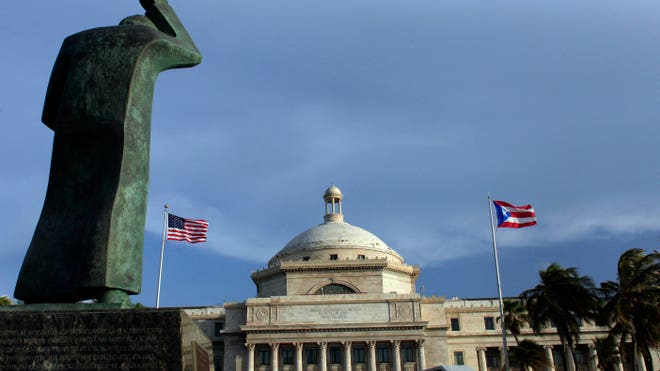Puerto Rico’s territorial status evidently does not provide the island with the necessary tools to overcome, by itself, the magnitude of the financial crisis it is currently facing. For decades, the Federal Government has perpetuated by its inaction an increasingly dysfunctional political-economic model on the island — one that at its core is, as President Ronald Reagan once characterized it, "historically unnatural.” Washington’s wholly unjustified procrastination has continued to this day, even after the people of Puerto Rico clearly voted to withdraw in 2012 their consent for maintaining the current territorial relationship.
The fact that Puerto Rico is fast becoming the poster child for underdevelopment under the U.S. flag should come as no surprise, as any political or economic model founded on the basis of perpetual civic disenfranchisement and inequality is doomed to fail miserably. As a matter of fact, were it not for federal welfare handouts, past economic stratagems such as Section 936 of the Internal Revenue Code and other short-term, unsustainable measures, Puerto Rico’s economy would have collapsed long ago, and in an even more dramatic manner.
The Federal Government, as the leading culprit of this unprecedented crisis, has a moral, political, and juridical obligation to intervene immediately. Why? A currently debated topic provides some insight: when the news first broke on the depth of Puerto Rico’s $73 billion debt problem, one of the local government’s initial reactions was to call on Congress to amend U.S. bankruptcy law in order to allow the island’s public corporations the benefits of bankruptcy protection. This is a protective mechanism that is available to government entities in the 50 states, and which had been available to Puerto Rico until Congress amended the statute back in 1984.
Despite the fact that this proposal has received almost unanimous support across the island’s political spectrum, at present it is still languishing in Congress. Efforts by the Puerto Rico Legislature to enact a similar law locally resulted in the federal court ruling that such a statute is unconstitutional, as it is preempted by federal law. Once again, this left Puerto Rico between the proverbial rock and a hard place.
This exemplifies the real problem: U.S. citizens being discriminated against solely because of their territorial place of residence, and an absolute denial of the most elemental right in a democracy: real political representation.
Those unfamiliar with Puerto Rico’s 117 year-old subordinated place in the American family should know that, although Puerto Ricans have been American citizens since 1917 and have valiantly served in every single war and conflict the U.S. has been involved in since then, they are barred from voting for President and from electing a proportionate congressional delegation which, given the island’s population, would include no less than five members in the U.S. House of Representatives and the requisite two United States senators.
Further, Puerto Ricans on the island are treated unequally in, or even totally excluded from, major federal programs, which by definition makes them second-class citizens.
Meanwhile, local administrations in Puerto Rico, who certainly bear their fair share of the blame for the current fiscal crisis, for years essentially adopted a "wait until tomorrow” attitude, allowing political expediency and improvisation to be used as the everyday tools of economic policy.
In essence, they paid their credit card debts with other credit cards, until the time came when they realized their debt payments exceeded receipts, and there were no more credit cards. Any individual family facing such circumstances would have moved much more swiftly to cut and curb expenses.
That is precisely what Puerto Rico’s previous administration started to do, but it cost Governor Fortuño his re-election. Not a surprise, given what has been tantamount to a pseudo-socialist economic model where close to 33 percent of all employment is in the government, and where the emphasis has been on government supremacy over the private sector.
Washington needs to step up and recognize that the only way to really resolve Puerto Rico’s long-standing fiscal woes is to enable the island to work its way out of what has proven to be its inherently flawed territorial status. And for its part, Puerto Rico also needs to elect new leadership in 2016. New leadership that, working with the Federal Government, must act decisively to end years of improvisation and implement sustainable pro-growth economic policies that are based upon the bedrock principles of civic equality and political empowerment.
And, perhaps more importantly, new leadership that will unequivocally demand from the Federal Government that it act upon the democratically expressed will of the island’s electorate, which in 2012 rejected territorial subordination and delivered a mandate that must be fulfilled, for Puerto Rico to become the 51st state of our great Union. The 3.5 million U.S. citizens of Puerto Rico and the greatest Democracy on Earth deserve no less.
Luis Bacó is the head of the Washington office of the San Juan-based McConnell Valdés law firm. He previously served as chief of staff to Congressman Luis Fortuño and deputy director of the Puerto Rico Federal Affairs Administration.
Washington needs to step up and recognize that the only way to really resolve Puerto Rico’s long-standing fiscal woes is to enable the island to work its way out of what has proven to be its inherently flawed territorial status. And for its part, Puerto Rico also needs to elect new leadership in 2016.
Luis Bacó

By Luis Bacó
Opinion: Rising to the challenge of fixing America’s failed Puerto Rico policies
No comments:
Post a Comment